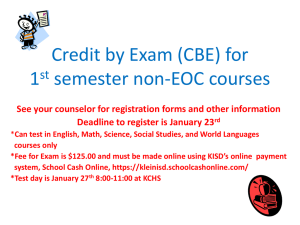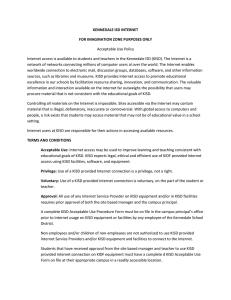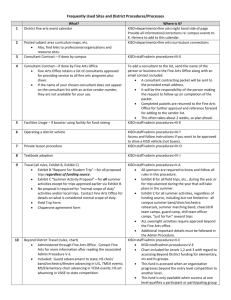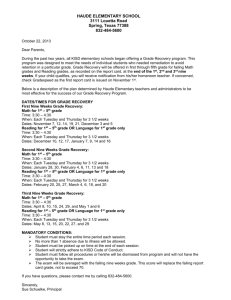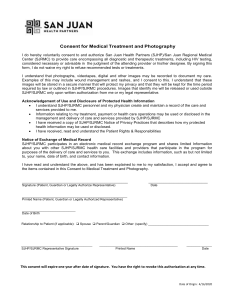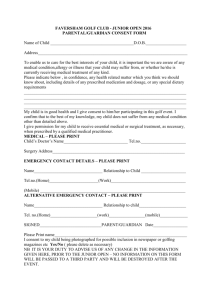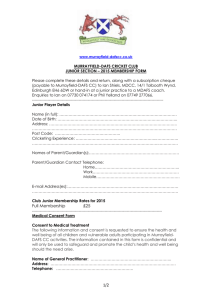Drug Testing Information - Killeen Independent School District
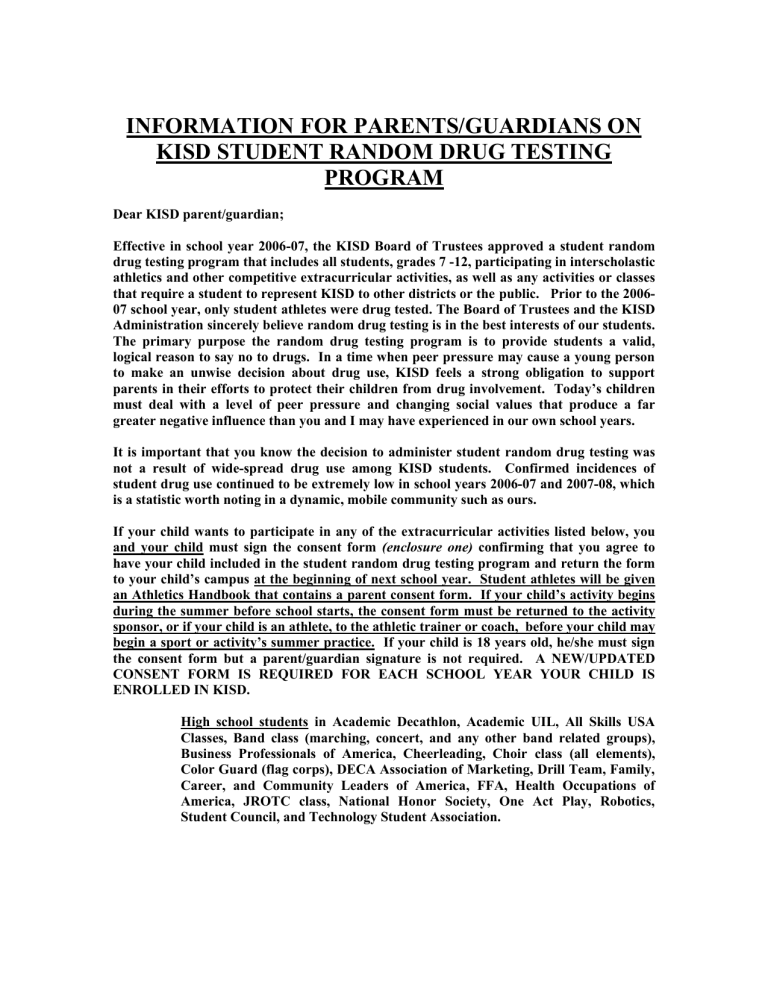
INFORMATION FOR PARENTS/GUARDIANS ON
KISD STUDENT RANDOM DRUG TESTING
PROGRAM
Dear KISD parent/guardian;
Effective in school year 2006-07, the KISD Board of Trustees approved a student random drug testing program that includes all students, grades 7 -12, participating in interscholastic athletics and other competitive extracurricular activities, as well as any activities or classes that require a student to represent KISD to other districts or the public. Prior to the 2006-
07 school year, only student athletes were drug tested. The Board of Trustees and the KISD
Administration sincerely believe random drug testing is in the best interests of our students.
The primary purpose the random drug testing program is to provide students a valid, logical reason to say no to drugs. In a time when peer pressure may cause a young person to make an unwise decision about drug use, KISD feels a strong obligation to support parents in their efforts to protect their children from drug involvement. Today’s children must deal with a level of peer pressure and changing social values that produce a far greater negative influence than you and I may have experienced in our own school years.
It is important that you know the decision to administer student random drug testing was not a result of wide-spread drug use among KISD students. Confirmed incidences of student drug use continued to be extremely low in school years 2006-07 and 2007-08, which is a statistic worth noting in a dynamic, mobile community such as ours.
If your child wants to participate in any of the extracurricular activities listed below, you and your child must sign the consent form (enclosure one) confirming that you agree to have your child included in the student random drug testing program and return the form to your child’s campus at the beginning of next school year. Student athletes will be given an Athletics Handbook that contains a parent consent form. If your child’s activity begins during the summer before school starts, the consent form must be returned to the activity sponsor, or if your child is an athlete, to the athletic trainer or coach, before your child may begin a sport or activity’s summer practice. If your child is 18 years old, he/she must sign the consent form but a parent/guardian signature is not required. A NEW/UPDATED
CONSENT FORM IS REQUIRED FOR EACH SCHOOL YEAR YOUR CHILD IS
ENROLLED IN KISD.
High school students in Academic Decathlon, Academic UIL, All Skills USA
Classes, Band class (marching, concert, and any other band related groups),
Business Professionals of America, Cheerleading, Choir class (all elements),
Color Guard (flag corps), DECA Association of Marketing, Drill Team, Family,
Career, and Community Leaders of America, FFA, Health Occupations of
America, JROTC class, National Honor Society, One Act Play, Robotics,
Student Council, and Technology Student Association.
Middle school students in Academic UIL, Band class (marching, concert, and any other band related groups), Cheerleading, Choir class (all elements), and
Pep Squad.
If a consent form is not signed and returned to the appropriate campus representative, your child will not be allowed to participate in athletics or the other listed activities. Families moving to the Killeen area whose children will enroll in KISD for the second semester, or at any other time during the school year, must sign a consent form before their children may participate in activities for which they are eligible.
Should you want more information, copies of the KISD Policy and KISD Administrative
Procedure on student random drug testing will be available at your child’s campus and at the KISD Administration Building (Office of the Deputy Superintendent) on W.S. Young
Drive. You may also view the policy on the KISD website, www.killeenisd.org
. Click on the
“Parents” button on the left side of the main page. On the next page, click on Policy
OnLine. Then, enter FNF in the “Enter Policy Code” box. Select Policy FNF (LOCAL).
If you still have questions after reviewing the material, please call the KISD Deputy
Superintendent’s office at 501-0048 and ask for Tal Anderson.
Sincerely,
Tal Anderson
Special Assistant for General Support
Office of the Deputy Superintendent
FREQUENTLY ASKED QUESTIONS CONCERNING
STUDENT RANDOM DRUG TESTING
1.
QUESTION: Is student drug testing legal?
ANSWER: A United States Supreme Court decision in June 2002 ruled that random testing of students in competitive extracurricular activities did not violate a student’s Constitutional rights.
2.
QUESTION: Do other school districts have student drug testing programs?
ANSWER: Many other Texas school districts and school systems in other states have student drug testing programs. Temple, Waco, Copperas Cove,
Grapevine-Colleyville (Dallas area), and Cypress-Fairbanks ISD (Houston area) are examples of other Texas school districts that have student drug testing programs.
3.
QUESTION: Do these districts test students who are in all the extracurricular activities that KISD is including in drug testing?
ANSWER: Each district decides what activities will be included. There is not a standard list of activities that must be included. In the examples above,
Temple and Waco ISD tests only student athletes. The others include the same or most of the same extracurricular activities KISD includes.
4.
QUESTION: The Army has a random drug testing program that requires the soldier giving urine samples to be directly observed by another person to ensure the sample is not altered or compromised in any way to avoid a positive test result. Are students directly observed this same way when giving urine samples?
ANSWER: Student drug test procedures do not require nor permit direct observation of the student giving the sample. Individual dignity is preserved to the extent possible. Students are alone in a restroom stall, with the stall door closed, when giving a sample.
5.
QUESTION: Are there procedures that keep samples from getting “mixed up” causing a student to show positive on a drug test when it was not his/her sample?
ANSWER: Samples are tightly controlled. A strict chain-of–custody of a sample is required in drug testing. Sample containers are labeled to preclude the likelihood of erroneous identification of test results. When the student completes giving the sample and opens the stall door, a drug testing monitor immediately takes the sample container from the student and seals the
container that has the label identifying the student. Samples are then handled only by authorized testing personnel.
6.
QUESTION: Who conducts the drug testing?
ANSWER: KISD currently contracts with an alcohol and drug testing company from Waco. This company is trained in all the administrative and legal rules and procedures for conduct of drug testing. Because the expanded program is new, KISD has issued a Request for Proposal (request for bids) that will allow comparison of services and costs from multiple bidders. Thus, a different company may be selected to provide testing starting in school year 2006-07. Bidders must meet very stringent requirements to be considered for selection.
7.
QUESTION: Do any KISD employees help conduct drug tests?
ANSWER: A urine specimen (sample) may be collected by a KISD nurse or athletic trainer but this is not a normal procedure. A licensed drug testing organization is responsible for collection of samples.
8.
QUESTION: What do the student drug tests identify?
ANSWER: KISD drug testing identifies presence of five items: amphetamines, cocaine metabolites, marijuana metabolites, opiate metabolites, and phencyclidine (commonly called P.C.P).
9.
QUESTION: If a student tests positive for drugs in his/her system, are academic grades affected?
ANSWER: No.
10.
QUESTION: What happens the first time a student tests positive?
ANSWER: There are two parts to the answer. (a) If it is a student athlete who tests positive, a conference will be held with the student athlete, the student’s parents/guardians, the campus athletic coordinator, campus principal, and the athletic trainer. (b) If the student is other than an athlete, that is, participating in one of the other extracurricular activities, the conference will be with the student, the student’s parents/guardians, campus principal, activity sponsor, student activities director, and the KISD program administrator. The student will become ineligible for thirty-five (35) school days to participate in any athletics or other activity, practice, or contest, beginning from the date the student athlete or other is first notified of a positive test result. Ineligibility ends on the 36 th school day after the date the student athlete (or other) is first notified of the positive test result and has been retested with the results of the test being negative. The District is responsible for any second test conducted.
11.
QUESTION: When a student tests positive a second time, what action is taken?
ANSWER: A student who has a second confirmed positive drug test will be suspended from any athletic or other extracurricular activity for the remainder of the student’s enrollment in KISD, following the date that the student’s parents or guardians are notified about the second positive test result.
12.
QUESTION: What happens if a student has only one positive drug test during the student’s middle school years and then has a second positive test when the student is in high school?
ANSWER: Middle school students with only one positive test during their middle school years will not have that positive counted against them when they enter high school. The count starts over so that the first time a student has a positive drug test in high school; it is treated as the “first offense”.
13.
QUESTION: Do some prescription drugs that a student might be taking cause a positive drug test?
ANSWER: A positive drug test result may be caused by some prescription drugs that a student may be taking. If a student is taking some type of prescription drug and tests positive, once the parents or guardians are notified about the positive test, they have five school days following the meeting with district officials who notified them about the positive test to provide the district with a medical explanation for the positive test result.
14. QUESTION: If a student has a positive drug test result, is there some type of consequence or punishment based on the KISD Student Code of Conduct?
ANSWER: While a positive drug test result indicates that a student has induced a prohibited substance into his/her body, that alone is not basis for application of the Student Code of Conduct rules concerning use of drugs, unless the use was recent enough that it is detectable by the student’s physical
appearance, actions, breath, or speech.
15. QUESTION: Can a student be drug tested without the parent’s or guardian’s knowledge?
ANSWER: A student will not be included in drug testing if the parent/guardian has not given permission in the form of a KISD consent form. The only exception is for a student who is 18 years old who may agree to be included in testing without parent/guardian consent.
